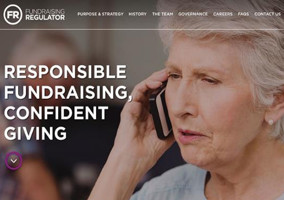Daniel Fluskey discusses how the Fundraising Regulator's decision on Neet Feet highlights that there is still work to do for the sector around vulnerable people.
The way that we respond and protect people in vulnerable circumstances is one of the most important – and challenging – issues for charity fundraising. It’s an area that has had much focus and debate, political and media interest, and one I’ve been looking at in real detail.
What’s come out of many conversations, meetings, and engagement across different charities, regulators, and sectors, is that this is one area where there is an absolutely shared commitment and desire from all to get it right and do better, but one that also seems to defy simple solutions or easy answers.
There is of course a counter-argument to ‘no easy answers’. Does that just mean ducking a difficult subject, passing the buck, giving too much discretion and leeway? There may be some rogue fundraisers seeking to get around the rules and avoid responsibility. But, that is 100 per cent not my experience of how genuine charity fundraisers think about this.
They want to do the right thing; no one wants to take advantage of people, pressurise supporters, or take a donation when they shouldn’t. The challenge that comes in treating everybody fairly is that doing the ‘right’ thing means responding to someone as an individual, not adopting a blunt approach that excludes groups of people and defines them by a mental or physical condition they’re in, their age, or a life event that they might be going through.
Investigation report a reminder
The importance has always been there but if we needed a reminder then it came last week with the Fundraising Regulator’s investigation report into Neet Feet and the charities they were working with. The Regulator found serious breaches of the Code in relation to the fundraising taking place, and in the monitoring of Neet Feet by most of the charities they were working on behalf of.
Adjudications and sanctions are an important part of the drive to improve practice, but this needs to be accompanied by culture and behavioural change too. When looking at policies, rules, and best practice in an area that is as inherently tricky as vulnerability, we will continually need to adapt and improve our approach.
The question we have to constantly keep asking is ‘how can we do better?’, and not simply ‘is this good enough?’ And we have to back this up by giving fundraisers the best chance to get it right by providing the resources and support they need to be able to respond to all and any individuals who may be in a vulnerable circumstance.
Meeting an individual's needs
At the Institute of Fundraising last week we published new updated guidance, Treating Donors Fairly, to help fundraisers deal with tricky situations and to adapt their approach where needed. I hope it’s useful in helping people think about the issues, understand what they can be doing, and provide a basis to think through how to meet an individual’s needs, while becoming more aware of issues around mental capacity and data protection.
A difficulty we can’t solve through guidance alone is the challenge of taking into account any individual’s circumstances, needs, or preferences where fundraisers have limited, or no, prior knowledge of an individual’s situation.
The test for success can’t be that someone who is in a vulnerable circumstance was approached - we should not be banning fundraisers from approaching people based on their age or another personal characteristic – but rather whether any apparent needs of that individual has been properly addressed and responded to.
The onus falls on fundraisers to make sure that they can pick up on any signs that an individual that they are in contact with might be in a vulnerable circumstance, and then adapt or change their approach.
Sometimes that will mean providing additional care or support to help an individual make an informed decision on their donation. On other occasions it might mean taking steps to make sure that you don’t ask for money or that you even refuse a donation when offered. But whatever the end response is, it will take responsibility, ownership, awareness and sensitivity from fundraisers to get there.
Fundraisers need support from leaders
Does this sound like a high benchmark to meet for fundraisers that have multiple priorities, income targets, and limited resources? Maybe. But often the things that seem tough are also the ones that we simply can’t avoid.
The worry of getting it wrong doesn’t mean we shy away from trying to get it right. Importantly this has to be an organisation-wide response, as well as the responsibility of individual fundraisers. Fundraisers need support and leadership from their managers, directors, and trustee boards to feel that they have the time and ability to respond appropriately, and the confidence to say no to a donation if they have concerns.
The responsibility also flows through to the partners and agencies that charities work alongside - our recent guidance published in the summer on successful partnerships should help in this area, but we may need to go further than guidance and advice. Would an accreditation scheme for agencies help to improve confidence and practice? And if so, what kind of model would work? It’s a question we think needs looking at, and one we will shortly be consulting our members on.
Related Articles












